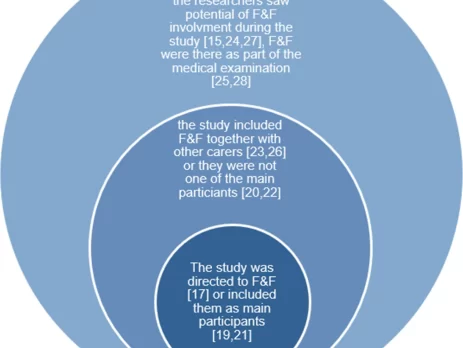We conducted a scoping review to investigate the role of informal carers of people with multiple sclerosis (pwMS) in digital health research. Out of 14 included studies, most focused on telemedicine, online education, or telerehabilitation, with varying degrees of involvement of family and friends (F&F). The findings indicate that while digital health can support carers and enhance their ability to assist pwMS, the current research landscape often overlooks their unique needs and contributions.
What was the context of our study?
Multiple sclerosis (MS) affects over 1.8 million people worldwide, with many relying on informal care provided by family and friends. These carers face challenges such as financial strain, emotional stress, and diminished quality of life. Digital health, encompassing tools like telemedicine, educational resources, and rehabilitative games, offers potential solutions to ease their burden and improve their caregiving experience. However, research into the inclusion and impact of informal carers in digital health interventions for pwMS is limited.
What did we do?
We conducted a scoping review guided by the PRISMA-ScR framework. Four databases (PubMed, Web of Science, Scopus, and CINAHL) were searched for original, peer-reviewed articles on digital health involving informal carers of pwMS. Out of 723 search results, 14 studies met the inclusion criteria. Data were extracted and synthesized to identify roles of F&F, the digital health aspects of the studies, and outcomes related to informal carers.
What did we find?
Informal carers were involved in varying capacities across the studies, ranging from active participants to incidental mentions in methods or results. Telemedicine was the most common digital health aspect, allowing carers to participate in remote appointments, assist with health assessments, and provide HCPs with valuable insights about pwMS. Online education and telerehabilitation also offered carers opportunities to gain knowledge and engage in shared activities with pwMS. Despite these benefits, few studies explicitly focused on carers’ experiences or tailored digital health solutions to their needs.
Why is this important?
This review highlights a significant gap in digital health research regarding the inclusion of informal carers of pwMS. Given the growing reliance on informal caregiving and the potential of digital health to alleviate caregiving burdens, it is imperative to design and study solutions that address carers’ specific challenges. By integrating carers into digital health initiatives, healthcare systems can improve outcomes for both carers and pwMS while optimizing resources.
Reference
Yrttiaho, T., Mylonopoulou, V., Giunti, G., Isomursu, M. (2024). The Viewpoint of Informal Carers of People with Multiple Sclerosis in Digital Health Research: A Scoping Review. In: Särestöniemi, M., et al. Digital Health and Wireless Solutions. NCDHWS 2024. Communications in Computer and Information Science, vol 2083. Springer, Cham. https://doi.org/10.1007/978-3-031-59080-1_23

